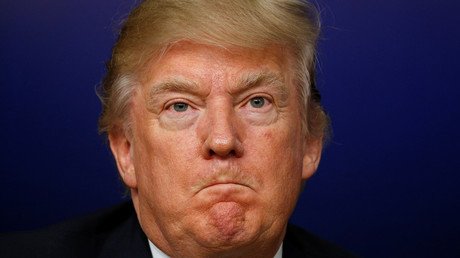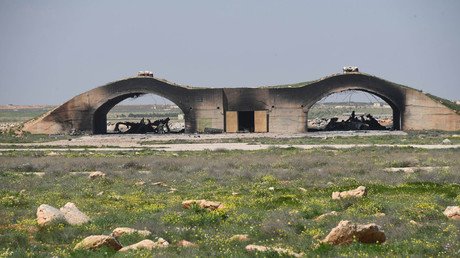US claims about chemical attack in Syria resemble Iraqi WMD claims in 2003 – Assad’s key advisor
US statements blaming the Syrian government for the chemical attack in Idlib closely resemble the claims the US made about the weapons of mass destruction (WMD) possessed by Iraq in 2003, the Syrian president’s senior advisor told RT.
The allegations made by the US concerning the Syrian government being behind the chemical weapons incident in the town of Khan Shaykhun, near Idlib, defy any logic, Bouthaina Shaaban underlined. She added that such an attack would be “against the interests of the Syrian government” as it would eventually only “harm both the Syrian people and the government.”
“One should ask, who the beneficiary of what has happened lately in Syria is,” the senior advisor to Syrian President Bashar Assad said. Shaaban said the terrorists could have carried out this attack to advance their offensive on the ground and to strengthen “the positions of their masters at the negotiating [table].”
She went on to say that the whole situation “reminds us of what happened in Iraq when the US occupied Iraq claiming that there is WMD there... There are so many stories that come out of Washington and then prove to be absolutely unfounded … after some time,” she pointed out. “Today, we all know that there was no WMD in Iraq."
Shaaban also warned that the US “could create any story as a pre-text or an excuse” to start a military campaign against Syria while vehemently denying the allegation that Damascus “has anything to do” with the chemical attack in Khan Shaykhun. “This incident was staged only as a pretext to strike Syria,” she said.
“The Organization for the Prohibition of the Chemical Weapons (OPCW) announced in June 2014 that Syria is absolutely free of chemical weapons,” she emphasized.
‘I don’t believe a word of it’ – CIA whistleblower on US intelligence about Syria chemical attack https://t.co/0ESPTGC5gh
— RT (@RT_com) 13 April 2017
President Assad's senior advisor also said the Syrian government welcomes the suggestion of an international investigation into the Khan Shaykhun incident. She said Damascus wants this investigation to be “unbiased” as well as “neutral, honest, and professional.” Shabaan said the Syrian government would also like to see Russian experts as part of the international investigative commission looking into this incident.
‘No place for terrorists in peace negotiations’
Shaaban also reaffirmed Damascus’ commitment to a political settlement of the Syrian crisis and said the Syrian government delegation would continue to take part in negotiations both in Geneva and Astana during a news conference in Moscow.
She said the US strike on Shayrat Air Base seriously complicated the negotiation process in Geneva, making the outcome of the talks “unclear.”
“The US strike is a very serious step, it is act of the US aggression against Syria. If such [aggression] would continue, it would complicate the situation at the negotiating table in Geneva.”
Shabaan told RT that terrorists consistently try to derail these negotiations because “they have no place” there.
The Syrian president’s advisor also charged that other regional players, such as Turkey, Saudi Arabia or Qatar are not really interested in ending the war in Syria. She said these countries are “trying to keep the war in Syria going and are trying to undermine any agreement” that could end the conflict.
She added that Syria is also subjected to massive pressure by the western media outlets who are “reluctant” to present any information, including experts opinions, which do not fit their narrative. Instead, she says, western media keep airing “the same false information” presented by those, “who want the war to continue raging through” Syria.
“We have no capabilities to counter this massive information attack we are facing as most media outlets are controlled by our enemies,” she told journalists in Moscow. She said the western media is “at the cutting edge of the offensive on Syria.”
US Navy destroyers fired 59 Tomahawk cruise missiles at the Shayrat airfield after US President Donald Trump blamed the Syrian government for the April 4 chemical weapons incident in the rebel-held town of Khan Shaykhun in Syria's Idlib province.
‘For us, 100% it’s fabrication, Syrian military destroyed all chemical weapons’ – Assad on Idlib attack https://t.co/cZ2ZFlKxMXpic.twitter.com/a67JIfUM7v
— RT (@RT_com) 13 April 2017
Russia denounced the US attack as “highly provocative” and said it would insist on an independent international investigation of the chemical weapons incident. Russia, Syria and Iran have condemned the attack as an act of international aggression.
The Russian Foreign Minister Sergey Lavrov has meanwhile said that he agreed with the US State Secretary Rex Tillerson that “a similar [strike] should not occur again.”
Speaking at the OPCW headquarters in the Hague, the Russian envoy, Aleksandr Shulgin, told delegates that Syria does not have a chemical weapons stockpile, and even if it theoretically did, Damascus had no practical reasons to use them.
“Was it necessary for the Syrian government to use chemical weapons even if theoretically it had any? Would it help from a military standpoint?” Shulgin asked.
“The Syrian army has enough conventional weapons, the army is combat-ready,” the diplomat said, noting victories in Aleppo and Palmyra while pointing that only terrorists have reason to use chemical weapons against civilians.
Shulgin also doubted whether Assad would personally conduct political suicide by using prohibited weapons on his own people: “They would have never achieved anything by the use of chemical weapons, except provoking anger of the international community.”














